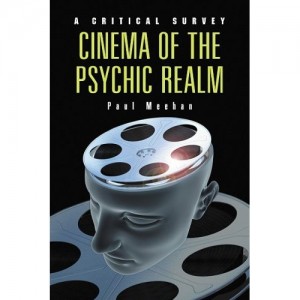 Paul Meehan is one of my favorite writers dealing with the fantastic in pop culture. He is the author of a number of books, including Saucer Movies: A UFOlogical History of the Cinema (Scarecrow Press, 1998) which he discussed here in a previous interview, Tech-Noir: The Fusion of Science Fiction and Film Noir (McFarland, 2008), and now Cinema of the Psychic Realm: A Critical Survey (McFarland, 2009). Paul stops by TheoFantastique once again, on this occasion to discuss his latest book.
Paul Meehan is one of my favorite writers dealing with the fantastic in pop culture. He is the author of a number of books, including Saucer Movies: A UFOlogical History of the Cinema (Scarecrow Press, 1998) which he discussed here in a previous interview, Tech-Noir: The Fusion of Science Fiction and Film Noir (McFarland, 2008), and now Cinema of the Psychic Realm: A Critical Survey (McFarland, 2009). Paul stops by TheoFantastique once again, on this occasion to discuss his latest book.
TheoFantastique: Paul, thanks for coming back to talk about another book of yours. I enjoy your work. With this discussion we turn our attention to paranormal phenomenon, particularly psychic or psi. How did you come to develop an interest in this research and its connection to cinema?
Paul Meehan: Being an avid sci-fi/horror fan, I always had an active curiosity about the factual phenomena that inspired movies like Carrie, Poltergeist, The Entity, The Exorcist and Star Wars. I also became interested in the psychic realm through my research into UFOs, especially after reading Pulitzer-nominated journalist Howard Blum’s 1990 book on the subject, Out There, in which Blum revealed that the U.S. government operated a cadre of psychic spies who used ESP to obtain information about UFOs. Later in the decade, books like David Morehouse’s Psychic Warrior and Jim Schnabel’s Remote Viewers confirmed Blum’s account and provided new details about the government’s classified remote viewing project. The notion of using the mystery of psi to probe the enigma of UFOs fascinated me, as did the theories of psychic functioning that provided the conceptual framework for remote viewing.
TheoFantastique: In your discussion how are you defining the psychic realm?
Paul Meehan: I wanted to concentrate on films dealing with the field of “scientific parapsychology” that focuses on researching the four main aspects of psi: clairvoyance, precognition, telepathy, and psychokinesis. The first three are aspects of “extra-sensory perception” or ESP, while psychokinesis, or PK, the movement or manipulation of physical objects by the power of the mind, is a more elusive phenomenon that is not amenable to laboratory study and is primarily associated with spontaneous outbreaks of poltergeist activity (termed “recurring spontaneous psychokinesis or RSPK by researchers). These four phenomena define the areas of inquiry studied by most mainstream scientific parapsychologists, so I wanted to exclude movies that dealt with supernatural or metaphysical concepts such as ghosts, reincarnation, etc., and concentrate on films that explore the scientific paradigm of psi.
TheoFantastique: Most people might assume that the psychic is almost always found in horror, sci fi or fantasy, but you discuss other genres of film that have featured it. Can you describe these genres and give an example of a film with the psychic from within them?
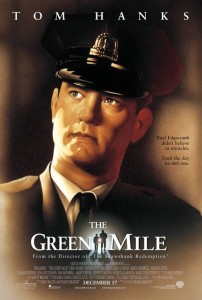 Paul Meehan: Because psychic experiences frequently occur in the context of people’s everyday lives, there are a number of films that deal with psi within a dramatic framework, including Resurrection, Powder, Phenomenon, The Green Mile and Premonition. In these films the uncanny nature of the psychic realm is downplayed in favor of the dramatic interaction between the characters. Real-life psychics have also been involved (with mixed results) in solving murder cases, and this is reflected in crime melodramas involving ESP such as Man on a Swing, Manhunter, In Dreams and The Gift. The criminality of bogus psychics defrauding credulous believers is addressed in a number of crime melodramas, including Murder, My Sweet, Nightmare Alley, and The Amazing Mr. X, Seance on a Wet Afternoon and Family Plot. Psi has also been used as a fantasy element to enliven comedies like Ghostbusters, The Butcher’s Wife, Wilder Napalm and What Women Want, and children’s movies like Disney’s Witch Mountain series, Matilda and The Last Mimzy. For children, the idea of psi functions as an equalizer that allows them to defy the authority of the adult world. Ironically, the paranormal is shown in its most benign and positive light in screen comedies and kidvid.
Paul Meehan: Because psychic experiences frequently occur in the context of people’s everyday lives, there are a number of films that deal with psi within a dramatic framework, including Resurrection, Powder, Phenomenon, The Green Mile and Premonition. In these films the uncanny nature of the psychic realm is downplayed in favor of the dramatic interaction between the characters. Real-life psychics have also been involved (with mixed results) in solving murder cases, and this is reflected in crime melodramas involving ESP such as Man on a Swing, Manhunter, In Dreams and The Gift. The criminality of bogus psychics defrauding credulous believers is addressed in a number of crime melodramas, including Murder, My Sweet, Nightmare Alley, and The Amazing Mr. X, Seance on a Wet Afternoon and Family Plot. Psi has also been used as a fantasy element to enliven comedies like Ghostbusters, The Butcher’s Wife, Wilder Napalm and What Women Want, and children’s movies like Disney’s Witch Mountain series, Matilda and The Last Mimzy. For children, the idea of psi functions as an equalizer that allows them to defy the authority of the adult world. Ironically, the paranormal is shown in its most benign and positive light in screen comedies and kidvid.
TheoFantastique: How far back does the depiction of the psychic go in film?
Paul Meehan: The German silent horror classic The Cabinet of Dr. Caligari (1919) contains psychic motifs relating to hypnotic mind control and somnambulism. Fritz Lang’s Dr. Mabuse the Gambler (1922) featured a super-criminal with hypno-telepathic powers. In the early sound period John Barrymore played the title character in Svengali (1931), a musical impresario with the psychic ability to transform a nobody into a diva. Another early film was the British production The Clairvoyant (1935), starring Claude Rains as a tortured individual who is unhappily gifted with prescience. Peter Ibbetson (1935) was an unusual tale involving the psychic phenomenon of dream telepathy that starred Gary Cooper.
TheoFantastique: When your discussion moves to horror films and the psychic you mention the influence of Stephen King. How influential have his stories and their film adaptations been in forming cultural views about psi?
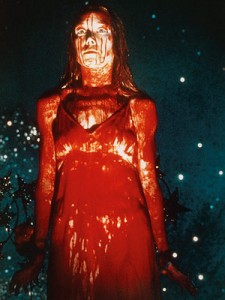 Paul Meehan: Aside from the Star Wars films, King’s fiction and movie adaptations have had perhaps the most profound influence on concepts of psi in our culture. The author has obviously done a bit of reading about parapsychology but his knowledge of this subject is not especially profound. King’s take on psi is naturally filtered through his perspective as a horror writer, which has resulted in a demonization of these phenomena that has been disseminated to a mass- market by King’s enormously popular books and movies. In screen adaptations of King’s work psi-enabled characters usually come to a horrible end. The telekinetic girl in Carrie “burns in Hell” after committing mass-murder upon her classmates because she has been provoked by her extreme humiliation, and later is murdered by her own mother. Psychics David Keith in Firestarter and Christopher Walken in The Dead Zone obtain their psi powers through drugs and a head injury respectively, and both of them develop brain tumors that are consuming them as a result of their becoming psychic. In these two films the psychics use their powers to cause positive political change, and Johnny Smith in The Dead Zone does use his clairvoyance to save lives and help people, but King’s portrayal of psi is largely a negative one and is connected with supernatural darkness, dread of the unknown, and morbidity. In his non-fiction book on horror, Danse Macabre, King states that he feels no need to maintain any factual fidelity to the psychic phenomena he exploits in his fiction.
Paul Meehan: Aside from the Star Wars films, King’s fiction and movie adaptations have had perhaps the most profound influence on concepts of psi in our culture. The author has obviously done a bit of reading about parapsychology but his knowledge of this subject is not especially profound. King’s take on psi is naturally filtered through his perspective as a horror writer, which has resulted in a demonization of these phenomena that has been disseminated to a mass- market by King’s enormously popular books and movies. In screen adaptations of King’s work psi-enabled characters usually come to a horrible end. The telekinetic girl in Carrie “burns in Hell” after committing mass-murder upon her classmates because she has been provoked by her extreme humiliation, and later is murdered by her own mother. Psychics David Keith in Firestarter and Christopher Walken in The Dead Zone obtain their psi powers through drugs and a head injury respectively, and both of them develop brain tumors that are consuming them as a result of their becoming psychic. In these two films the psychics use their powers to cause positive political change, and Johnny Smith in The Dead Zone does use his clairvoyance to save lives and help people, but King’s portrayal of psi is largely a negative one and is connected with supernatural darkness, dread of the unknown, and morbidity. In his non-fiction book on horror, Danse Macabre, King states that he feels no need to maintain any factual fidelity to the psychic phenomena he exploits in his fiction.
TheoFantastique: For me, one of the most interesting parts of your discussion was that of The Exorcist. When I initially read this section I did so with great skepticism as to your classification and inclusion, but as I read on I was surprised to learn of the actual case, that of the Haunted Boy, upon which the film was based, and that it is better understood as a case of poltergeist activity rather than alleged demonic possession. Can you address this?
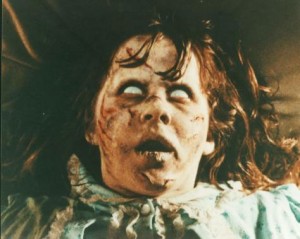 Paul Meehan: The Roman Catholic Church is extremely conservative in the matter of possession, and recognizes three stages in the process: obsession, which corresponds to poltergeist activity, infestation, in which the afflicted person’s body is directly affected, and possession, in which the afflicted demonstrates knowledge of hidden events, can tell the future, read minds and exhibits other superhuman abilities. In parapsychological terms, obsession and infestation correspond to poltergeist activity, while the true indicator of possession consists of manifestations of precognition, telepathy and clairvoyance. After the exorcism of the “Haunted Boy” (whose true identity has never been revealed to the public) in St. Louis in 1949, the Church conducted a thorough investigation of the event and concluded that it was not a genuine case of demonic possession because all of these conditions had not been met. Father Walter Halloran, who served as one of the exorcists, agrees, claiming that the Haunted Boy did not exhibit a fluency in foreign languages, predict future events or read minds, although the poltergeist manifestations were quite spectacular. Fr. Halloran is on record as saying, “I saw more evil in Vietnam than I saw in that hospital bed,” and an interview with Halloran appears on the special features DVD of the 2001 Showtime movie Possessed, which was also based on the Haunted Boy case. Father John Nicola, who worked as a technical consultant on The Exorcist, concurs with this evaluation, and famed parapsycholigist J.B. Rhine also studied the case and declared it to be a poltergeist event.
Paul Meehan: The Roman Catholic Church is extremely conservative in the matter of possession, and recognizes three stages in the process: obsession, which corresponds to poltergeist activity, infestation, in which the afflicted person’s body is directly affected, and possession, in which the afflicted demonstrates knowledge of hidden events, can tell the future, read minds and exhibits other superhuman abilities. In parapsychological terms, obsession and infestation correspond to poltergeist activity, while the true indicator of possession consists of manifestations of precognition, telepathy and clairvoyance. After the exorcism of the “Haunted Boy” (whose true identity has never been revealed to the public) in St. Louis in 1949, the Church conducted a thorough investigation of the event and concluded that it was not a genuine case of demonic possession because all of these conditions had not been met. Father Walter Halloran, who served as one of the exorcists, agrees, claiming that the Haunted Boy did not exhibit a fluency in foreign languages, predict future events or read minds, although the poltergeist manifestations were quite spectacular. Fr. Halloran is on record as saying, “I saw more evil in Vietnam than I saw in that hospital bed,” and an interview with Halloran appears on the special features DVD of the 2001 Showtime movie Possessed, which was also based on the Haunted Boy case. Father John Nicola, who worked as a technical consultant on The Exorcist, concurs with this evaluation, and famed parapsycholigist J.B. Rhine also studied the case and declared it to be a poltergeist event.
TheoFantastique: At the conclusion of your discussion of The Exorcist you reference the significance of the most influential horror film being based on a parapsychological event. Why do you think this is often missed?
Paul Meehan: After the conclusion of the Haunted Boy affair in 1949 the Church, wishing to avoid further publicity, suppressed all knowledge and documentation of the event. William Peter Blatty was mystified by an article about the exorcism that appeared in the Washington Post when he was a junior at Georgetown University studying for the priesthood, and using his connections within the Church, he managed to obtain a diary of the exorcism kept by the officiating priests. When the movie version of The Exorcist was released in 1973 there was a flurry of interest in the Haunted Boy case, but because information about the exorcism was still being suppressed by the Church, there was no new information to be revealed. Unlike later films such as The Amityville Horror or The Entity, The Exorcist was not marketed as being “based on a true story.” In 1974 Blatty published a paperback entitled William Peter Blatty on The Exorcist: From Novel to Film, which contained an account of the Haunted Boy affair, but for some reason this information never resonated with the public. There was a break in the case when the Alexian Brothers Hospital in St. Louis, where the exorcism had taken place, was being torn down in 1978. Inside a room in the psychiatric ward that had been kept locked since 1949, workmen found a carbon copy of the same diary that Blatty had used to write The Exorcist, making the facts of the case available to researchers for the first time. Considering all the hysteria and religious fervor that surrounded the original release of the film, its possible that the notion of the movie being based on a real-life event was just too psychologically disturbing and the culture tuned out to this knowledge en masse. A complete account of the Haunted Boy case can be found in Thomas B. Allen’s excellent 1993 book Possessed: The True Story of an Exorcism.
TheoFantastique: In your discussion you state that psi in horror films have blurred the distinction between the paranormal and supernatural. How is this so and how do you see them as distinct?
Paul Meehan: Horror films exploit the more sensational aspects of psi in order to scare the audience, therefore they tend to portray it as something weird and unnatural, an ability usually wielded by vampires, aliens and assorted human misfits for mind control and other evil, life- negating purposes. Psi is depicted as a fantastic, unearthly force that operates outside of natural laws in a separate reality populated by ghosts, gods, demons and other non-material creatures that stand outside of nature as we understand it and are therefore “supernatural.” Modern parapsychology considers psychic phenomena to be in the realm of the “preternatural,” that is, something that is part of the natural world that we have yet to understand but will someday be amenable to scientific analysis as our understanding grows. Psi researchers strive to demonstrate that psychic abilities are not abnormal faculties possessed only by unusual or abnormal people but are inherent abilities of the human mind and part of our everyday world.
TheoFantastique: How and when did science fiction alien films acquire the psi element?
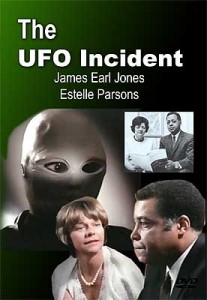 Paul Meehan: Telepathic aliens had appeared in sci-fi pulp fiction during the 1930s and 40s and naturally gravitated to movie screens during the science fiction film wave of the 1950s. The psychic aspect of screen extraterrestrials was not as prevalent as I had originally supposed, however. Although a number of 50s-era saucer movies depicted UFOnauts with mind control powers, these mind-melds were frequently achieved using a ray or lamplike device, as in The Man from Planet X, This Island Earth and Earth vs. The Flying Saucers, using an implant in Invaders from Mars or by physically entering human bodies in Kronos and Enemy from Space. Aliens must create physical doubles of humans rather than controlling their minds in The Purple Monster Strikes, It Came from Outer Space, Invasion of the Body Snatchers and I Married a Monster from Outer Space. Telepathic ETs only appeared in a few minor sci-fi efforts that appeared late in the cycle like Killers from Space, The Brain from Planet Arous, Not of this Earth and The Space Children. When UFO abduction reports began to surface in the 1960s, abductees told of encountering telepathic aliens and this detail was attributed to the influence of science fiction, but the first depiction of Gray alien telepaths did not appear until the 1975 telefilm The UFO Incident, which was based on the famous Betty and Barney Hill abduction case from 1961. Of course, the best known alien in screen history, Spielberg’s E.T., was not only telepathic but used telekinesis as well. The most intriguing aspect of the alien/psychic connection are films in which psi-endowed humans go up against telepathic aliens in movies like Species and Starship Troopers, something that happened in real life when the U.S. government employed psychic remote viewers to use their ESP to try to penetrate the UFO mystery.
Paul Meehan: Telepathic aliens had appeared in sci-fi pulp fiction during the 1930s and 40s and naturally gravitated to movie screens during the science fiction film wave of the 1950s. The psychic aspect of screen extraterrestrials was not as prevalent as I had originally supposed, however. Although a number of 50s-era saucer movies depicted UFOnauts with mind control powers, these mind-melds were frequently achieved using a ray or lamplike device, as in The Man from Planet X, This Island Earth and Earth vs. The Flying Saucers, using an implant in Invaders from Mars or by physically entering human bodies in Kronos and Enemy from Space. Aliens must create physical doubles of humans rather than controlling their minds in The Purple Monster Strikes, It Came from Outer Space, Invasion of the Body Snatchers and I Married a Monster from Outer Space. Telepathic ETs only appeared in a few minor sci-fi efforts that appeared late in the cycle like Killers from Space, The Brain from Planet Arous, Not of this Earth and The Space Children. When UFO abduction reports began to surface in the 1960s, abductees told of encountering telepathic aliens and this detail was attributed to the influence of science fiction, but the first depiction of Gray alien telepaths did not appear until the 1975 telefilm The UFO Incident, which was based on the famous Betty and Barney Hill abduction case from 1961. Of course, the best known alien in screen history, Spielberg’s E.T., was not only telepathic but used telekinesis as well. The most intriguing aspect of the alien/psychic connection are films in which psi-endowed humans go up against telepathic aliens in movies like Species and Starship Troopers, something that happened in real life when the U.S. government employed psychic remote viewers to use their ESP to try to penetrate the UFO mystery.
TheoFantastique: In your chapter on the psychic in sci-fi films you write: “While in the real world the paranormal is shunted aside into fringe areas of science and lurid supermarket tabloid headlines, in the universe of entertainment psychic themes have vast currency with film audiences.” Why do you think there is this dichotomy of psi reception in these spheres?
Paul Meehan: Film can confer an aura of unreality on fantastic subjects that audiences know are the product of special effects illusion and therefore not to be taken too seriously. Like the movies, the tabloids also exploit the more lurid and sensationalistic aspects of the paranormal. Mainstream scientists continue to turn up their collective noses at the concept of psi even though there is ample experimental evidence of its existence. Much of the anti-psi prejudice is the product of a Judeo-Christian religious mindset that connects the paranormal with notions of unholy sorcery (“Thou shalt not suffer a witch to live,” etc.), ungodliness and the Antichrist, as only God’s prophets and saviors are allowed to perform miracles. This spiritual angst is also exploited by moviemakers in films like Resurrection, Carrie and The Gift. These religious attitudes, held by some U.S. government officials, were partly responsible for the dismantling of the military psychic remote viewing program in the early 1990s. Beyond this, I think that the idea of psi is psychologically disturbing to many people who are afraid of getting their minds read or their fortunes foretold by individuals with mysterious powers of mind. On the other hand, movie audiences have no problems with being entertained by these same dread phenomena in a fantasy context.
TheoFantastique: Do you see a long and continued relationship between psi and cinema?
Paul Meehan: Psi has, to some extent, has replaced the concept of supernatural magic in our modern-day fairy tales as a vehicle of wonder. You might say that psi is magic transformed by science for the modern world. As such, it’s an endless source of inspiration for movie makers as evidenced in recent films like Push and Race to Witch Mountain. In these films, state of the art special effects make the paranormal world even more cinematic. The psychic realm will always hold a fascination for the human mind and will continue to entertain film audiences for a long time to come.
TheoFantastique: Paul, thanks again for your book and for discussing it here.
Paul Meehan: Thanks so much for giving me a forum to discuss my book.





3 Responses to “Paul Meehan: Cinema of the Psychic Realm”